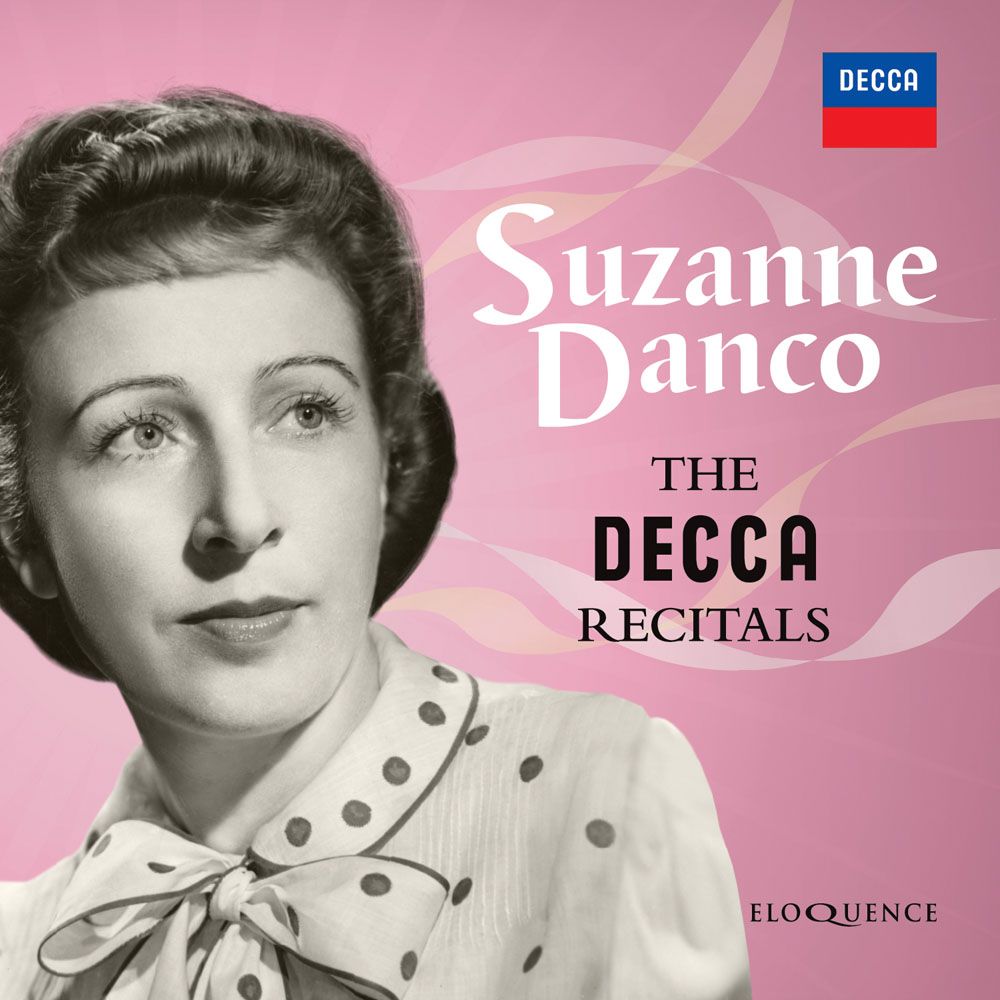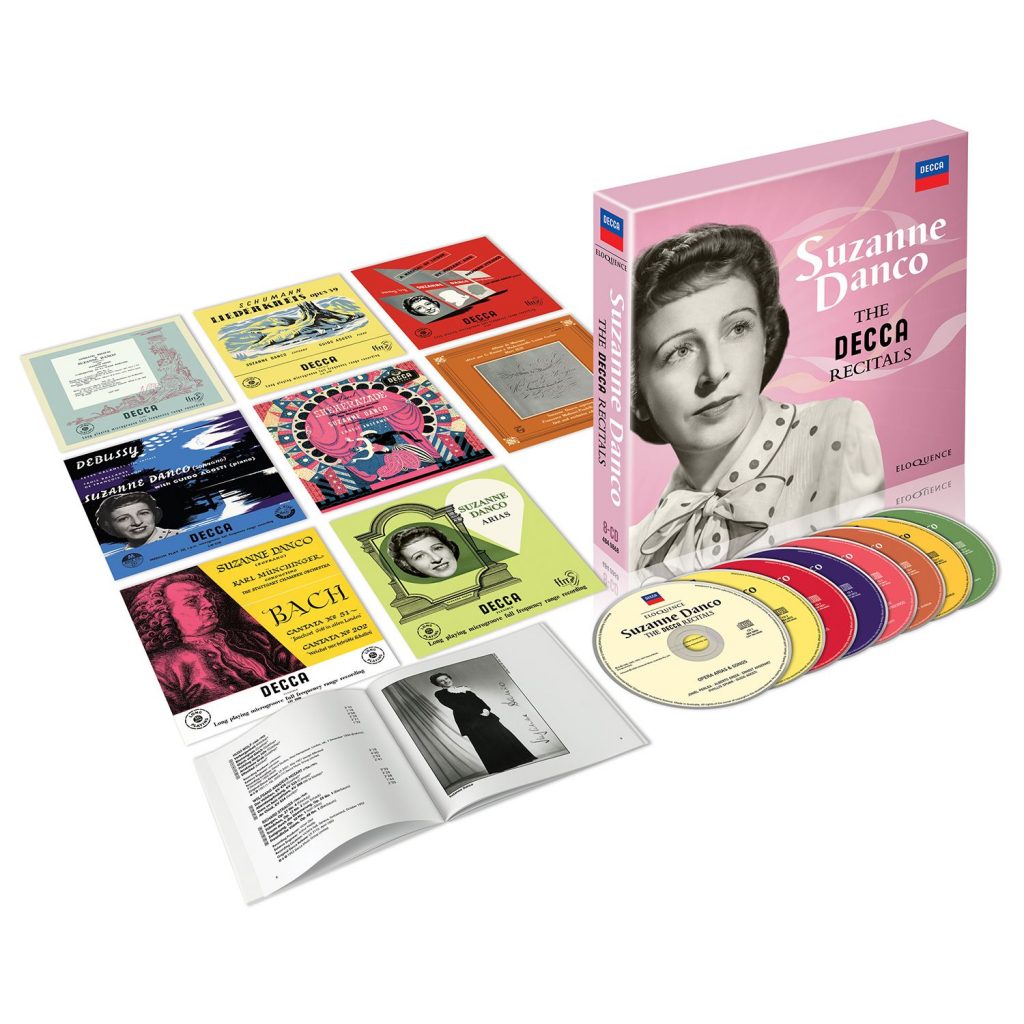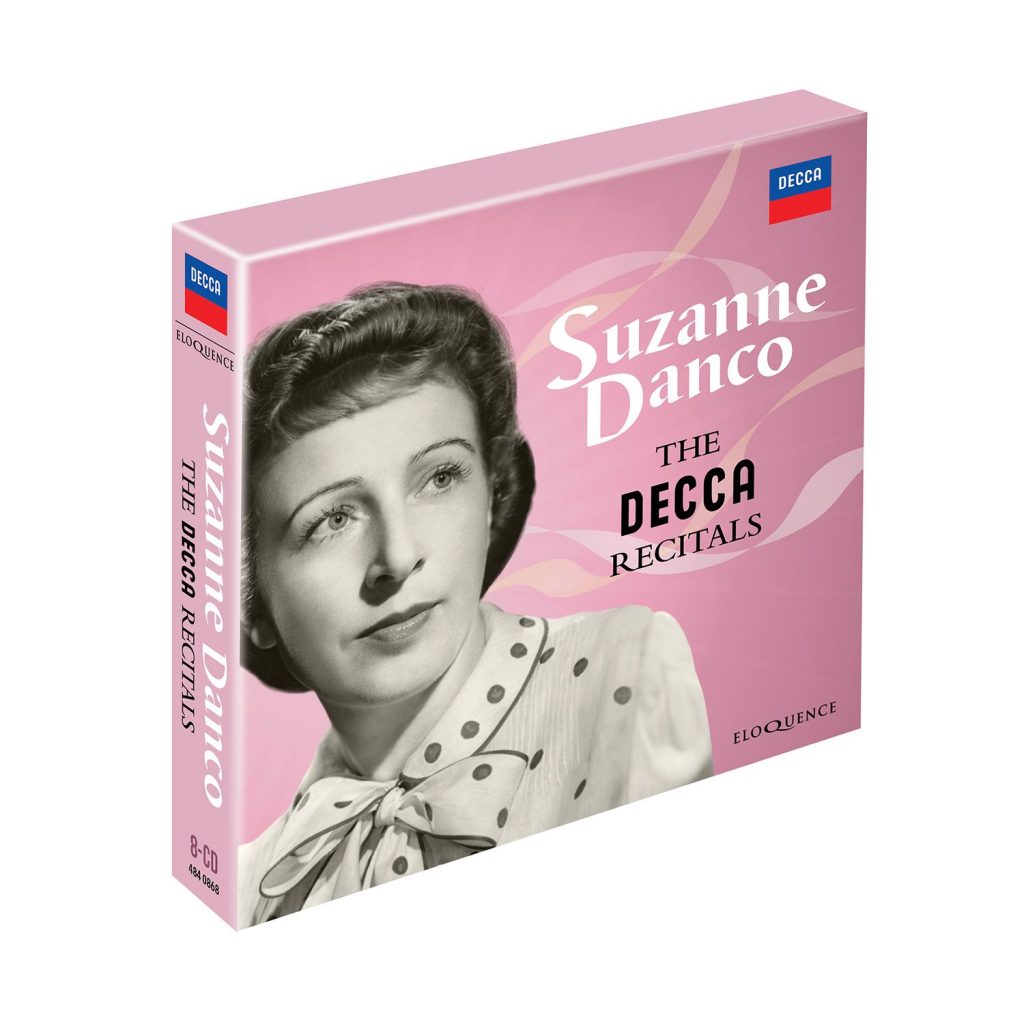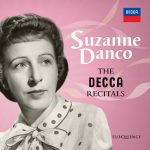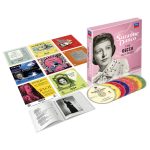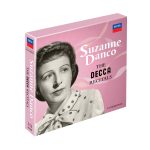The complete Decca recital recordings compiled and newly remastered in tribute to a superlative Mozart soprano of the last century – released to commemorate the 20th anniversary of her passing (10 August 2000).
The Belgian-born Suzanne Danco (1911–2000) made her operatic debut in Genoa as Fiordiligi in 1941, and it seems appropriate that in July 1947 in Milan she began her Decca relationship with a selection of Mozart arias. Equally fittingly, her first operatic recording was Pelléas et Mélisande with Ernest Ansermet and L’Orchestre de la Suisse Romande in April 1952. Ansermet always regarded Danco as his ideal Mélisande and, like Erich Kleiber, became a valued admirer of her artistry.
Danco’s legacy on record is small but representative of her particular gifts in Mozart and French song, in which she was an almost unrivalled interpreter, leaving unforgettably refined readings of Debussy’s Fêtes galantes, Fauré’s La bonne chanson and Ravel’s Shéhérezade, among others. The Debussy and Fauré count among the highlights of a series of Decca albums made with her long-time recital partner, Guido Agosti, and compiled here complete for the first time.
There is much else in the box that is new to CD or long unavailable: a lovely 10-inch collection of lullabies, songs of Bellini and arie antiche; her refined touch applied to the German Lieder tradition, from Schubert and Schumann (including a rare soprano version of Dichterliebe) to Brahms, Wolf and Richard Strauss, all generously and intelligently chosen recitals; Danco herself regarded Schumann’s Op. 39 Liederkreis as one of her finest recordings. Wolf’s Elfenlied from sessions in December 1950 was discovered among the tapes and is published here for the first time in any format.
A delightful pendant to Danco’s recording career is an album of 18th-century songs made for Philips Classics in October 1956 near her home in Florence, made with conductor Francesco Mollinari-Pradelli at the piano. The collection closes with an anthology of highlights from her contributions to classic Decca recordings of oratorio and opera, including her Cherubino, Donna Anna, Eurydice, Mélisande and Consuela (L’heure espagnole).
CD 1
OPERA ARIAS & SONGS
1 MOZART Così fan tutte: Come scoglio
2 MOZART Le Nozze di Figaro: Voi che sapete
Orchestra del Teatro alla Scala
Jonel Perlea
3 CHARPENTIER Louise: Depuis le jour
4 VERDI La Traviata: E strano … Ah, fors’è lui … Sempre libera
5 MASSENET Manon: Allons … Adieu, notre petite table
6 BIZET Carmen: C’est les contrabandiers … Je dis que rien ne m’épouvante
7 GLUCK Alceste: Divinités du Styx
8 PURCELL Dido and Aeneas: Thy hand, Belinda … When I am laid in earth
L’Orchestre de la Suisse Romande
Alberto Erede
9–11 RAVEL Shéhérazade
L’Orchestre de la Société des Concerts du Conservatoire de Paris
Ernest Ansermet
12 BONONCINI Deh più a me non v’ascondete*
13 CACCINI Amarilli mia bella*
Phyllis Spurr, piano
14 SCHUBERT Die schöne Mullerin – No. 2: Wohin? (Take 1)*
15 SCHUBERT Die schöne Mullerin – No. 2: Wohin? (Take 2)*
16 SCHUBERT Die Forelle*
Guido Agosti, piano
*FIRST CD RELEASE ON DECCA
CD 2
ROBERT SCHUMANN (1810–1856)
1–16 Dichterliebe, Op. 48*
17–28 Liederkreis, Op. 39*
FRANZ SCHUBERT (1797–1828)
29 Der Hirt auf dem Felsen, D.965
Gervase de Peyer, clarinet
30 Die Forelle, D.550
31 Gretchen am Spinnrade, D.118
32 Du bist die Ruh, D.776
33 Der Musensohn, D.764
Guido Agosti, piano
*FIRST CD RELEASE ON DECCA
CD 3
JOHANNES BRAHMS (1833–1897)
1 Die Mainacht*
2 Wiegenlied*
3 Ständchen*
4 Wir wandelten*
5 Meine Liebe ist grün*
HUGO WOLF (1860–1903)
6 Verborgenheit*
7 Blumengruss*
8 Gleich und Gleich*
9 Frühling übers Jahr*
10 Anakreons Grab*
11 Elfenlied°
WOLFGANG AMADEUS MOZART (1756–1791)
12 Das Veilchen*
13 Abendempfindung*
14 Dans un bois solitaire*
15 An Chloë*
RICHARD STRAUSS (1864–1949)
16 Morgen
17 Ständchen
18 Traum durch die Dämmerung
19 Zueignung
20 Freundliche Vision
CHRISTOPH WILLIBALD GLUCK (1714–1787)
21 O del mio dolce ardor*
ALESSANDRO SCARLATTI (1660–1725)
22 Se Florinda è fidele*
ANTONIO CALDARA (1670–1736)
23 Come raggio del sol*
FRANCESCO DURANTE (1684–1755)
24 Danza, danza*
GIULIO CACCINI (1551–1618)
25 Amarilli mia bella*
Guido Agosti, piano
*FIRST CD RELEASE ON DECCA
°PREVIOUSLY UNPUBLISHED
CD 4
CLAUDE DEBUSSY (1862–1918)
1–3 Trois Chansons de Bilitis, L.90*
4–6 Le Promenoir des deux amants, L.118*
7–12 Ariettes oubliées, L.60
GABRIEL FAURÉ (1845–1924)
13–21 La Bonne Chanson, Op. 61*
CLAUDE DEBUSSY (1862–1918)
22–24 Fêtes galantes I, L.80*
25–27 Trois Ballades de François Villon, L.119*
Guido Agosti, piano
*FIRST CD RELEASE ON DECCA
CD 5
MAURICE RAVEL (1875–1937)
1–3 Shéhérazade
4–5 Deux Mélodies hébraïques
6–8 Trois poems de Stéphane Mallarmé
L’Orchestre de la Suisse Romande
Ernest Ansermet
VINCENZO BELLINI (1801–1835)
9 Il fervido desiderio*
10 Dolente imagine di fille mia*
11 Vanne, o rosa fortunata*
12 Vaga luna che inargenti*
CHARLES GOUNOD (1818–1893)
13 Venise*
14 Au rossignol*
15 Viens ! Les gazons sont verts !*
FRANZ SCHUBERT (1797–1828)
16 Ave Maria*
FELIX MENDELSSOHN (1809–1847)
17 Auf flügeln des Gesanges*
JOHANNES BRAHMS (1833–1897)
18 Wiegenlied*
CHARLES GOUNOD (1818–1893)
19 Sérénade*
GABRIEL FAURÉ (1845–1924)
20 Après un rêve*
CHARLES GOUNOD (1818–1893)
after JOHANN SEBASTIAN BACH (1685–1750)
21 Ave Maria*
Guido Agosti, piano
*FIRST CD RELEASE ON DECCA
CD 6
Album de Musique offert par G. Rossini à Mademoiselle Louise Carlier
1 ROSSINI Mi lagnerò tacendo
2 BELLINI Dolente imagine
3 PAER Ange à la voix tendre
4 BRUGUIÈRE Le printemps arrive (Ester Orel, mezzo-soprano)
5 PANSERON Il n’aurait pas dû venir
6 TADOLINI Com’è soave a l’anima
7 COSTA Trova un sol, mia bella Clori
8 MARLIANI La gita in gondola
9 MERCADANTE Aure amiche, ah! non spirate
10 MORLACCHI La rosa appassita
11 MEYERBEER Soave l’istante
12 BERTON Air à trois notes
13 BERTIN Ah, dors en paix, mon bel enfant
14 CHERUBINI La pietosa bugia
15 SPONTINI L’adieu
16 ONSLOW Le Dante dans le paradis
17 GORDIGIANI Ognuno tira l’acqua al suo mulino
18 BAZZINI Chi ami?
Francesco Molinari-Pradelli, piano
HECTOR BERLIOZ (1803–1869)
19–24 Les Nuits d’été
Cincinnati Symphony Orchestra
Thor Johnson
CD 7
JOHANN SEBASTIAN BACH (1685-1750)
1–5 Cantata ‘Jauchzet Gott in allen Landen!’, BWV 51
6–14 Cantata ‘Weichet nur, betrübte Schatten’, BWV 202
Stuttgarter Kammerorchester
Karl Münchinger
HEINRICH SCHÜTZ (1585–1672)
15 Eile mich, Gott, zu erretten, SWV 282*
JOHANN SEBASTIAN BACH (1685–1750)
16 Bist du bei mir, BWV 508*
17 Warum betrübst du dich, mein Herz, BWV 516*
18 Komm, süsser Tod, BWV 478*
Jeanne Demessieux, organ
CD 8
Arias
WOLFGANG AMADEUS MOZART (1756–1791)
1–2 Le Nozze di Figaro
Wiener Philharmoniker
Erich Kleiber
CHRISTOPH WILLIBALD GLUCK (1714–1787)
3–6 Orphée et Eurydice (Act III Scene 1)
Orchestre des Concerts Lamoureux
Hans Rosbaud
WOLFGANG AMADEUS MOZART (1756–1791)
7–9 Don Giovanni
Wiener Philharmoniker
Josef Krips
CLAUDE DEBUSSY (1862–1918)
10–12 Pelléas et Mélisande
MAURICE RAVEL (1875–1937)
13 L’Enfant et les sortilèges
14 L’Heure espagnole
ARTHUR HONEGGER (1892–1955)
15 Le Roi David
CLAUDE DEBUSSY (1862–1918)
16 Le Martyre de Saint Sébastien
GABRIEL FAURÉ (1845–1924)
17 Requiem, Op. 48
L’Orchestre de la Suisse Romande
Ernest Ansermet
Suzanne Danco, soprano
CD 1
Tracks 1-2
Recording Producer: Victor Olof
Balance Engineer: Arthur Haddy
Recording Location: Teatro alla Scala, Milan, Italy, 30 July 1947
Matrix no.: IAR352-53
First Decca 78rpm Release: K 1732: March 1948
Tracks 3-8
Recording Producer: Victor Olof
Balance Engineer: Arthur Haddy
Recording Location: Victoria Hall, Geneva, Switzerland, April 1950
Original Decca Release: K 28310-13 (78rpm): c.1950–51 / LXT 2557: March 1951
Tracks 9-11
Recording Producer: Victor Olof
Balance Engineer: Kenneth Wilkinson
Recording Location: La Maison de la Mutualité, Paris, France, 28 May 1948
Matrix no.: FAR34-37
Original Decca Release: K 1966-67: October 1948
Tracks 12-13
Recording Producer: Victor Olof
Balance Engineer: Kenneth Wilkinson
Recording Location: West Hampstead Studios, London, UK, 3 October 1947
Matrix no.: AR11601-02
Original Decca Release: K 2070: January 1949
Tracks 14-16
Recording Producer & Balance Engineer: unknown
Recording Location: Decca Studios, West Hampstead, London, UK, 19 April 1949
Matrix Nos.: DR 13426-27
Original Decca Release: M658: September 1950
CD 2
Tracks 1-16
Recording Producer: unknown
Balance Engineer: unknown
Recording Location: Decca Studios, West Hampstead, London, UK, 26–28 April 1949
Original Decca Release: AK2310-12 (78rpm): February 1950, LX 3039: 1951
Tracks 17-28
Recording Producer: unknown
Balance Engineer: unknown
Recording Location: Victoria Hall, Geneva, Switzerland, 9 April 1952
Original Decca Release: LX 3107: March 1953
Tracks 29-33
Recording Producer: D.M. Walker
Balance Engineer: unknown
Recording Location: Decca Studios, West Hampstead, London, UK, 23–24 January 1956
Original Decca Release: LL 1465: 1956
CD 3
Tracks 1-11
Recording Producer: unknown
Balance Engineer: unknown
Recording Location: Decca Studios, West Hampstead, London, UK, 7 December 1950 (Brahms), 8 December 1950 (Wolf)
Original Decca Release: LX 3051: May 1951 (except Elfenlied)
Tracks 12-20
Recording Producer: Victor Olof
Balance Engineer: Arthur Haddy
Recording Location: Victoria Hall, Geneva, Switzerland, October 1952
Original Decca Release: LX 3110: April 1953
Tracks 21-25
Recording Producer: Victor Olof
Balance Engineer: Gil Went
Recording Location: Rome, July 1952
Original Decca Release: LX 3113: July 1953
CD 4
Tracks 1-12
Recording Producer: unknown
Balance Engineer: unknown
Recording Location: Decca Studios, West Hampstead, London, 7, 8 & 9 December 1950
Original Decca Release: LX 3052: May 1951
Tracks 13-21
Recording Producer: unknown
Balance Engineer: unknown
Recording Location: Victoria Hall, Geneva, Switzerland, 8 April 1952
Original Decca Release: LX 3111: March 1953
Tracks 22-27
Recording Producer: James Walker
Balance Engineer: Gil Went
Recording Location: Victoria Hall, Geneva, Switzerland, May 1954
Original Decca Release: LW 5145: November 1954
CD 5
Tracks 1-8
Recording Producer: Victor Olof
Balance Engineers: Gil Went, Roy Wallace
Recording Location: Victoria Hall, Geneva, Switzerland, October/November 1954
Original Decca Release: LXT 5031: March 1955
Tracks 9-15
Recording Producer: James Walker
Balance Engineers: Gil Went, Roy Wallace
Recording Location: Victoria Hall, Geneva, Switzerland, May 1954
Original Decca Release: LW 5128: September 1954
Tracks 16-21
Recording Producer: Victor Olof
Balance Engineer: Gil Went
Recording Location: Teatro Pergola, Florence, Italy, August 1955
First release LW 5229: January 1956
CD 6
Tracks 1-18
Recording Producer: Vittorio Negri
Recording Engineers: Hans Lauterslager, Tony Buczynski
Recording Location: Conservatoire Luigi Cherubini, Florence, Italy, 6–9 October 1956
Original Philips Release: A00427L: 1957
Tracks 19-24
Recording Producer: Remy Farkas
Balance Engineer: Cyril Windebank
Recording Location: Music Hall, Cincinnati, USA, 24 April 1951
Original Decca Release: LXT 2605: September 1951
CD 7
Tracks 1-14
Recording Producer: Victor Olof
Balance Engineer: Gil Went
Recording Location: Victoria Hall, Geneva, Switzerland, September 1953
Original Decca Release: LXT 2926: May 1954
Tracks 15-18
Recording Producer: Victor Olof
Balance Engineer: Arthur Haddy
Recording Location: Victoria Hall, Geneva, Switzerland, October 1952
Original Decca Release: LX 3113: July 1953
CD 8
Tracks 1-2
Recording Producers: Victor Olof, Eduardo Pedrazzoli, Peter Andry
Balance Engineers: Cyril Windebank, James Brown
Recording Location: Redoutensaal, Vienna, Austria, June 1955
Original Decca Release: LXT 5088-91 (mono): October 1955; SXL 2087-90 (stereo): February 1959
Tracks 3-6
Recording Producer: Germain
Recording Engineer: Georges Poutot
Recording Location: Salle Apollo, Paris, France, April 1956
Original Philips Release: AL363/4: 1957
Tracks 7-9
Recording Producers: Victor Olof, Eduardo Pedrazzoli, Peter Andry
Balance Engineers: Cyril Windebank, James Brown
Recording Location: Redoutensaal, Vienna, Austria, June 1955
Original Decca Release: LXT 5103-6 (mono): October 1955 SXL 2117-20 (stereo): May 1959
Tracks 10-12
Recording Producer: Victor Olof
Balance Engineer: Gil Went
Recording Location: Victoria Hall, Geneva, Switzerland, April 1952
Original Decca Release: LXT 2711-4: September 1952
Track 13
Recording Producer: Victor Olof
Balance Engineers: Gil Went, Roy Wallace
Recording Location: Victoria Hall, Geneva, Switzerland, October–November 1954
Original Decca Release: LXT 5019 (mono): February 1955; SXL 2212 (stereo): June 1960
Track 14
Recording Producer: Victor Olof
Balance Engineers: Gil Went, Roy Wallace
Recording Location: Victoria Hall, Geneva, Switzerland, May–June 1953
Original Decca Release: LXT 2828: October 1953
Track 15
Recording Producer: James Walker
Balance Engineers: Roy Wallace, Gil Went, James Brown
Recording Location: Victoria Hall, Geneva, Switzerland, October 1956
Original Decca Release: LXT 5321-22: May 1957
Track 16
Recording Producer: James Walker
Balance Engineers: Roy Wallace, Gil Went
Recording Location: Victoria Hall, Geneva, Switzerland, May 1954
Original Decca Release: LXT 5024: March 1955
Track 17
Recording Producers: Victor Olof, James Walker
Balance Engineers: Gil Went, Roy Wallace
Recording Location: Victoria Hall, Geneva, Switzerland, 16 October 1955
Original Decca Release: LXT 5158: February 1956 (mono); SXL 2211: June 1960 (stereo)
“Just the right balance between knowingness and innocence which lies at the heart of that equivocal role.” Daily Telegraph (Pelléas et Mélisande)
“Madame Danco’s fine voice and Ansermet’s magnificent accompaniment … It would be quite difficult to imagine a combination that could do more justice to these extremely beautiful songs.” Tempo, winter 1948 (Shéhérezade)
“Danco has the sensibility and the judgment required. Above all, she knows just the proper amount of weight and stylized emotion to infuse so that her renderings are just right in every sense.” Irish Monthly, June 1953 (Mozart & Strauss Lieder)
“It might be argued that [La Bonne Chanson] is preferably a man’s song-cycle, but with supreme artistry Mme. Danco wins the listener over to viewing the songs in a new light. Brighter colours emerge in this interpretation and, in particular, her control and phrasing make the performance outstanding.” Tempo, autumn 1953
“Miss Danco is in excellent form.” High Fidelity, April 1954 (Strauss)
“Mme. Danco manages the expressive cantilena of Bellini’s songs … very beautifully, and her voice is well recorded.” Musical Times, April 1955
“Suzanne Danco makes an admirable Cherubino, ardent and youthful – a feat of characterization all the more astonishing when one has just listened to her Donna Anna.” Musical Times, February 1956
“Miss Danco is well recorded. She chooses brisker tempi for all the songs, nearer the given metronome marks, and her spring-like voice is pretty throughout.” Music & Letters, October 1956 (Les Nuits d’été)
“This record comes close to perfection. Miss Danco brings to these superb Lieder a fine-spun voice, secure vocalism and exquisite musicianship.” High Fidelity, July 1956 (Liederkreis)
“Miss Danco is a most accomplished artist whose performances are always intelligent and in perfect taste.” Music & Letters, October 1956 (Debussy, Chansons)
“Suzanne Danco’s devastating coolness is more effective than any amount of husky sexiness.” Opera, July 1987 (L’heure espagnole)

